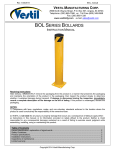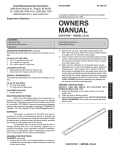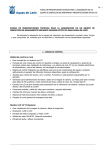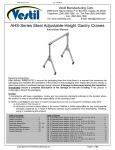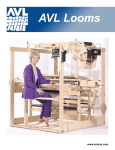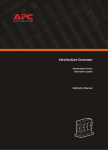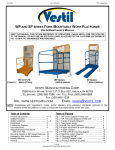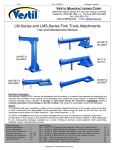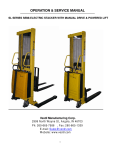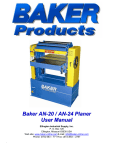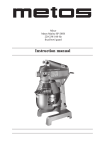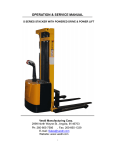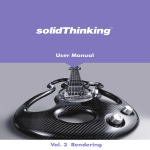Download Manual - V E S T I L D O
Transcript
Rev. 0213 EPT, Manual.doc VESTIL MANUFACTURING CORP. 2999 North Wayne Street, P.O. Box 507, Angola, IN 46703 Telephone: (260) 665-7586 -or- Toll Free (800) 348-0868 Fax: (260) 665-1339 www.vestilmfg.com e-mail: [email protected] EPT-SERIES ELECTRIC PALLET TRUCKS OPERATION AND MAINTENANCE MANUAL Receiving instructions: After delivery, IMMEDIATELY remove the packaging from the product in a manner that preserves the packaging and maintains the orientation of the product in the packaging; then inspect the product closely to determine whether it sustained damage during transport. If damage is discovered during the inspection, immediately record a complete description of the damage on the bill of lading. If the product is undamaged, discard the packaging. NOTES: 1) Compliance with laws, regulations, codes, and non-voluntary standards enforced in the location where the product is used is exclusively the responsibility of the owner/end-user. 2) VESTIL is not liable for any injury or property damage that occurs as a consequence of failing to apply either: a) Instructions in this manual; or b) Information provided on labels affixed to the product. Neither is Vestil responsible for any consequential damages sustained as a result of failing to exercise sound judgment while assembling, installing, using or maintaining this product. TABLE OF CONTENTS PAGE Safety Principles 2 Product Introduction 2 Safety Guidelines 3 Removing EPT from Pallet 3-4 Use, 1st Inspection, & Functions Tests 20 Operation 20-21 Lifting & Transporting Loads 21 Batteries & Charger 21-22 Troubleshooting Changing Cylinder 23-48 28-31 Changing Throttle Assy. 32-36 Changing Motor Assy. 37-39 Replacing Forward/Reverse Contactor 40-42 Changing Battery Charger 43-46 Adding Quencharcs 47-48 TABLE OF FIGURES PAGE Fig. 1A EPT Main Body Components 5 Fig. 1B EPT-30 (optional) Scale Components 6 Fig. 2 EPT-30 Hydraulic Cylinder Assembly 7 Fig. 3 EPT-30 Drive Wheel Assembly 8 Fig. 4A EPT-30 Fork & Carriage 9 Fig. 4B EPT-30 Fork & Carriage (optional) Scale 10 Fig. 5A Control Yoke & Handle Components 11-12 Fig. 5B Control Yoke & Handle (optional) Scale 13-14 Fig. 6 Hydraulic Pump & Motor Assemblies 15 Fig. 7 EPT-45 Main Housings & Supporting Structure 16 Fig. 8 Removable Battery Box & Components 16 Fig. 9 EPT-45 Cylinder & Fuse Panel 17 Fig. 10 EPT-45 Fork & Carriage Assemblies 18 Fig. 11 Function Controls, Gauges, & Safety Features 19 Maintenance & Inspections 49-50 Markings 51 Copyright 2013 Vestil Manufacturing Corp. Page 1 of 51 Rev. 0213 EPT, Manual.doc PRODUCT INTRODUCTION Thank you for purchasing an electric pallet truck (“EPT,” “pallet truck,” “truck,” or “unit”) offered by Vestil Manufacturing Corporation (“Vestil”). Our EPT’s are durable, high-quality products that combine safety features and low-maintenance mechanisms. Despite the product’s relatively simple mechanics, all personnel must familiarize themselves with the safe operation instructions provided in this manual. Specifications for each of the 4 models appear in the table below: MODEL EPT-2047-30 EPT-2547-30 EPT-2048-45 EPT-2748-45 Net Wt. (lbs.) 660 671 990 1012 Fork Size (W x L) in inches 20in. X 47in. 25in. x 47in. 20in. x 48in. 27in. x 48in. Service Range (in.) 3.2 to 7.8 3.2 to 7.8 3.4 to 8 3.4 to 8 Capacity (lbs.) 3,000 3,000 4,500 4,500 Overall Size (W X L x H) in inches 28 x 65 x 49 28 x 65 x 49 30x 78.5 x 49 30x 78.5 x 49 Vestil Manufacturing Corp. created this manual to acquaint owners and users of our electric pallet trucks with safe operation and maintenance procedures. Employers are responsible for instructing employees to use the product properly. Employees and any other persons, who might foreseeably use, repair, or perform maintenance on the EPT must read and understand every instruction BEFORE using the device. Cart operators should have access to the manual at all times and should review the directions before each use. Contact Vestil for answers to any question you have after reading the entire manual. Although Vestil diligently strives to identify foreseeable hazardous situations, this manual cannot address every conceivable danger. The end-user is ultimately responsible for exercising sound judgment at all times. SAFETY PRINCIPLES We offer four types of electric pallet truck (EPT): two 3,000 pound (~1364kg) capacity models, the EPT-204730 and 2547-30, and two 4,500 pound (~2045kg) capacity models, the EPT-2048-45 and 2748-45. Each unit conforms to the generalized specifications disclosed in this manual and fulfills our demanding standards for quality, safety and durability. Vestil Manufacturing Corp. recognizes the critical importance of workplace safety. Each person who might participate in operation or maintenance of the product must read this manual. Read the entire manual and fully understand the directions BEFORE using or performing maintenance on the cart. If you do not understand an instruction, contact Vestil for clarification. Failure to adhere to the directions in this manual might lead to serious personal injury or even death. Vestil is not liable for any injury or property damage that occurs as a consequence of failing to apply the safe operation and maintenance procedures explained in this manual or that appear on labels affixed to the product. Furthermore, failure to exercise good judgment and common sense may result in property damage, serious personal injury, or death, and also are not the responsibility of Vestil. This manual applies the hazard identification methods suggested for instruction manuals by the American National Standards Institute (ANSI). In accordance with ANSI guidelines for hazard identification language, this manual classifies personal injury risks and situations that could lead to property damage with SIGNAL WORDS. These signal words announce an associated safety message. The reader must understand that the signal word chosen indicates the seriousness of that hazard according to the following convention: Identifies a hazardous situation which, if not avoided, WILL result in DEATH or SERIOUS INJURY. Use of this signal word is limited to the most extreme situations. Identifies a hazardous situation which, if not avoided, COULD result in DEATH or SERIOUS INJURY. Indicates a hazardous situation which, if not avoided, COULD result in MINOR or MODERATE injury. Identifies practices not related to personal injury, such as operation that could damage the cart. No safety alert symbol (equilateral triangle enclosing an exclamation point) accompanies this signal word. Copyright 2013 Vestil Manufacturing Corp. Page 2 of 51 Rev. 0213 EPT, Manual.doc SAFETY GUIDELINES Failure to read and understand the instructions included in this manual before using or servicing the pallet truck constitutes misuse of the product. Study the entire manual before you use the truck for the first time and before each subsequent use. Read the manual to refresh your understanding of the safe use and maintenance procedures on p. 50-51. If questions remain after you finish reading the manual, contact Vestil for answers. DO NOT attempt to resolve any problem with the truck unless you are certain that it will be safe to use afterwards. ¾ ¾ To decrease the risk of electrocution: DO NOT contact or operate the pallet truck close to electrified wires or other sources of electricity; Before operating the EPT, always inspect the area where you will use it. Improper use might result in serious personal injuries to the operator and/or bystanders. To minimize the possibility of injury, ALL persons who might operate, perform maintenance on, or service the EPT must read, understand and apply the following instructions: x DO NOT operate the EPT unless and until you are: 1. Trained to use the machine; AND 2. Certified as a trained operator by your employer in accordance with U.S. OSHA regulations (29 CFR §1910.178) and any standards incorporated by reference (e.g. ANSI/ITSDF B56.1-2005). x DO NOT attempt to lift or transport loads that exceed the rated capacity. x Inspect the machine before each use; DO NOT use the EPT unless it is in normal condition. Normal operating condition exists if the EPT passes the inspection and functions tests described under the heading, “Inspect the EPT & Perform a Functions Tests” on p. 20. x DO NOT use the unit until you read and understand the entire owner’s manual. Review the manual before each use AND before performing maintenance on the device. x DO NOT use the EPT if the load-supporting elements sustain any structural damage. Structural elements include, but are not limited to, the forks, carriage, and wheels. If structural damage is present, immediately tag the unit “Out of Service” and inform maintenance personnel of the problem. x DO NOT use the EPT if it makes unusual noises during operation. x DO NOT allow people to ride on the pallet truck. Only the operator of an EPT equipped with a properly installed rider platform (EPT x DO NOT attempt to lift an unevenly distributed load. Always center and evenly distribute the load on the forks. x DO NOT operate the EPT on surfaces (ramps or grades) angled more than 4 degrees. x DO NOT leave the EPT unattended while it supports a load. Always fully lower the forks, and then completely disengage the skid or pallet. Complete the parking / storing procedure described in “Storing the EPT” on p. 22. x DO NOT modify the pallet truck without first receiving written authorization from Vestil. Unauthorized modifications may make the EPT unsafe to use. x x To maximize the service life of the EPT and to prevent damage: Always store the machine in a secure, dry location where it will not interfere with traffic or other activities. Maintain the product as suggested in “Maintenance & Inspections” on p. 49-50. REMOVING THE PALLET TRUCK FROM THE SHIPPING PALLET: The pallet truck is shipped in ready-to-use condition. However, it must first be removed from the shipping pallet before it can be used for the first time. DO NOT attempt to drive the pallet truck off of the pallet; it might tip over and cause bodily injuries or property damage. To minimize the risk of injury to yourself or other persons, perform the following steps to remove the machine from the shipping pallet: 1. Remove all packing material. 2. Inform all personnel not participating in the unpacking process to clear the area. 3. Lift the EPT off of the pallet using either a hoist or a forklift with a capacity of at least 2,000 pounds. Always apply the proper hoisting procedures or forklift operation practices you learned during your training program. To remove the EPT from the shipping pallet using a hoist: EPT-2###-45 models: Remove the battery box. a) Disconnect the power cable from the socket on top of the EPT housing (circled in photo 1 below). Unfasten the box from the EPT frame by unscrewing the bolt in the center of the flange; the bolt is shown in photograph 2 (next page). Copyright 2013 Vestil Manufacturing Corp. Page 3 of 51 Rev. 0213 EPT, Manual.doc b) Connect the sling to both hook points on the EPT (1 on each side; the picture below only shows the hook point on the right side); then lift the unit no more than 6 – 8 inches above the pallet. The EPT will tilt towards the control yoke. Additionally, it may swing from side-to-side once free of the pallet if you did not properly position the hoist above the center of the sling. Stabilize the suspended truck with one hand, and stand safely to the side while operating the hoist. 2 1 3 All Models: Securely connect the sling hooks to the hook points (see photographs below), lift the EPT a few inches off of the pallet, direct the EPT away from the pallet, and then lower it until it is entirely supported by the ground. Hook point EPT-45 EPT-30 To lift the EPT with a forklift: Avoid contacting the drive wheel with the tines of your forklift; contact could damage the drive wheel. Loading side Operator Side Approach the pallet truck from the operator side. Lift the EPT just a few inches above the pallet. Slowly back the forklift away from the pallet, and then carefully lower the forks until the EPT rests firmly on the ground. Copyright 2013 Vestil Manufacturing Corp. Page 4 of 51 Rev. 0213 EPT, Manual.doc FIG. 1A: EPT-30 MODELS MAIN BODY COMPONENTS 2003 Item No. 2001 Part No. EPT-30-2001 2002 2003 2004 EPT-30-2002 EPT-30-2003 EPT-30-2004 EPT-30-2001-2 EPT-30-2004-2 2005 2006 2007 2008 2009 2010 2011 2012 2013 2014 2015 2016 2017 2018 2019 2020 EPT-CORD EPT-30-2005 EPT-30-2006 EPT-30-2007 EPT-30-2008 EPT-30-2009 EPT-30-KSA EPT-30-2010 EPT-30-2011 EPT-30-2012 EPT-30-2013 EPT-30-2014 EPT-30-2015 EPT-30-2016 EPT-30-2017 EPT-30-2018 EPT-30-2019 EPT-30-2020 Description Main Body Housing Housing Screw Battery Cover Battery (2 per unit) Battery Charger (OEM) Item No. 2021 2022 2023 2024 2025 Replacement Charger (OEM Unit) 2026 Battery Charger Cord 2027 M6 Spring Washer 2028 M6 Nut 2029 24V Battery Charge Gauge 2030 Key Switch 2031 Emergency Stop Switch 2032 Key Switch Assembly 2033 M6 Flat Washer 2034 M6 x 25 Bolt 2035 Set Pin 2036 Pivot Link Arm 2037 Bushing 2038 16mm Snap Ring 2039 Main Body 2040 20mm Snap Ring 2041 Bushing 2042 Cylinder Pivot Pin, Upper 2043 Cylinder Pivot Pin, Lower 2044 2045 Copyright 2013 Vestil Manufacturing Corp. Part No. EPT-30-2021 EPT-30-2022 EPT-30-2023 EPT-30-2024 EPT-30-2025 EPT-30-2026 EPT-30-2027 EPT-30-2028 EPT-30-2029 EPT-30-2030 EPT-30-2031 EPT-30-2032 EPT-30-2033 EPT-30-2034 EPT-30-2035 EPT-30-2036 EPT-30-2037 EPT-30-2038 EPT-30-2039 EPT-30-2040 EPT-30-2041 EPT-30-2042 EPT-30-2043 EPT-30-2044 EPT-30-2045 Description 22mm Snap Ring 10mm Washer M10 x 22 Screw Bolt Bolt Wheel 76 x 36 M12 Nut Wheel Frame Shaft Bushing Bearing Plate Bearing 30205 Bearing Plate Ball Bearing 6205 25mm Washer M10 Nut 8mm Washer Fixed Ring Link Rod Bolt Mounting Plate 8mm Washer Bolt Wheel Stabilizer Assembly Upper Travel Limit Switch Page 5 of 51 Rev. 0213 EPT, Manual.doc FIG. 1B: EPT-30 MODELS (OPTIONAL) SCALE COMPONENTS Item No. 4001 4002 4003 4004 4005 4006 4007 4008 4009 4010 Part No. Description EPT-30-SCL-4001 Scale Display EPT-30-SCL-4002 Display Mounting Bracket EPT-30-SCL-4003 6mm Flat Washer EPT-30-SCL-4004 M6 x 10 Bolt EPT-30-SCL-4005 M6 x 30 Bolt EPT-30-SCL-4006 6mm Spring Washer EPT-30-SCL-4007 M6 Nut EPT-30-SCL-4008 M6 Nut EPT-30-SCL-4009 EPT-30-SCL-4010 Copyright 2013 Vestil Manufacturing Corp. Page 6 of 51 Rev. 0213 EPT, Manual.doc FIG. 2: EPT-30 MODELS HYDRAULIC CYLINDER ASSEMBLY Item No. Part No. 4200 4201 4202 4203 4204 4205 4301 4302 4303 4304 4305 4401 4402 4403 4300 EPT-30-4200 EPT-30-4201 EPT-30-4202 EPT-30-4203 EPT-30-4204 EPT-30-4205 EPT-30-4301 EPT-30-4302 EPT-30-4303 EPT-30-4304 EPT-30-4305 EPT-30-4401 EPT-30-4402 EPT-30-4403 EPT-30-4300 Copyright 2013 Vestil Manufacturing Corp. Description Cylinder Assembly Cylinder Body Tube Gland Tube Nut Piston Piston Rod O-Ring Seal Ring Seal Ring O-Ring O-Ring Hydraulic Hose Seal Kit (EPT 30 & 45) Page 7 of 51 Rev. 0213 EPT, Manual.doc FIG. 3: EPT-30 MODELS DRIVE WHEEL ASSEMBLY Item No. Part No. Description Item No. Part No. Description Not Shown EPT-30/45-DBA Drive Brake Assembly 3015 EPT-30-3015 Pinion Gear 3300 Complete Drive Wheel Assembly (includes Motor) EPT-30-3001 24VDC (700W) Drive Motor EPT-30-3002 Woodruf Key EPT-30-3003 Motor Adaptor Ring EPT-30-3004 5 x 16 Dowel Pin EPT-30-3005 M6 x 15 Cap Screw EPT-30-3006 6mm Washer EPT-30-3007 Replacement Polyurethane Drive Wheel EPT-30-3007-R Replacement Rubber Drive Wheel EPT-30-3008 140 x 180 x 12 Oil Seal EPT-30-3009 Wheel Bearing EPT-30-3010 Snap Ring EPT-30-3011 Bull Gear EPT-30-3012 Grease Seal EPT-30-3013 Gear Box Casting EPT-30-3014 Idler Gear 3016 EPT-30-3016 Key 3017 3018 3019 3020 3021 3022 3023 EPT-30-3017 EPT-30-3018 EPT-30-3019 EPT-30-3020 EPT-30-3021 EPT-30-3022 EPT-30-3023 3024 EPT-30-3024 Motor Shaft Pilot Bearing 3025 3026 3027 3028 3029 3030 3031 EPT-30-3025 EPT-30-3026 EPT-30-3027 EPT-30-3028 EPT-30-3029 EPT-30-3030 EPT-30-3031 3001 3002 3003 3004 3005 3006 3007 3007 3008 3009 3010 301 3012 3013 3014 EPT-30-DWA EPT-30-MTR-BLT Copyright 2013 Vestil Manufacturing Corp. Pinion Gear Bearing Cap Cap Screw M6 x 15 Cap Screw Motor Retainer Cap Screw Drive Gear Spacer Spacer Brake Mounting Adapter Splined Coupling Snap Ring Brake Pad Brake Coil Cap Screw M6-1.0 x 185mm Motor Bolt Page 8 of 51 Rev. 0213 EPT, Manual.doc FIG. 4A: EPT-30 MODELS FORK AND CARRIAGE Item No. 1001 1002 1003 1004 1005 1006 1007 1008 1009 1010 1011 Not Shown 1012 Part No. EPT-30-1001 EPT-30-1002 EPT-30-1003 EPT-30-1004 EPT-30-1005 EPT-30-1006 EPT-30-1007 EPT-30-1008 EPT-30-1009 EPT-30-1010 EPT-30-1011 Description Fork Assembly M6 Nut Nose Wheel M6 x 45 Screw Snap Ring Ball Bearing 6204z 75 x 96 Load Roller Load Roller Axle 5 x 30 Roll Pin Load Roller Bracket Bracket Pin EPT-30-EXT-RL Steel Exit Roller EPT-30-1012 Push Rod Pin Item No. 1012 1013 1013-2 1014 1015 1016 1017 1018 1019 1020 1021 1021 1022 1023 Copyright 2013 Vestil Manufacturing Corp. Part No. EPT-30-1012-2 EPT-30-1013 EPT-30-1013-2 EPT-30-1014 EPT-30-1015 EPT-30-1016 EPT-30-1017 EPT-30-1018 EPT-30-1019 EPT-30-1020 EPT-30-1021-25 EPT-30-1021-20 EPT-30-1022 EPT-30-1023 Description Push Rod Pin (Hole in Center) 40” Push Rod 37-1/2” Push Rod Lock Nut Clevis Clevis Pin 22 x 20 Sleeve Bearing Trunion Shaft 16mm Snap Ring 16 x 16 Clevis Pin Sleeve Bearing Trunion (Model EPT-2547-30) Trunion (Model EPT-2047-30) 22mm Snap Ring Pin Page 9 of 51 Rev. 0213 EPT, Manual.doc FIG. 4B: EPT-30 MODELS FORKS AND CARRIAGE WITH INTEGRATED SCALE Item No. 1001 1002 1003 1004 1005 1006 1007 1008 1009 1010 1011 1012 1013 1014 1015 1016 1017 Part No. Item No. 1018 1019 1020 1021 1022-A 1022-B 1023 1024 1025 1026 EPT-30-SCL-1011 Description Fork Assembly Nose Wheel Frame M10 x 65 Screw Nose Wheel M10 Nut Retaining Ring Ball Bearing 6204z Drive/Load Wheel 75 x 90 Drive/Load Wheel Axle Roll Pin 5 x 30 Load Roller Bracket EPT-30-SCL-1012 Load Roller Bracket Pivot Pin EPT-30-SCL-1013 Push Rod Pivot Pin EPT-30-SCL-1014 Push Rod (Owner must provide measurement) 4011 4012 4013 EPT-30-SCL-1015 M22 x 1.5 Lock Nut Push Rod Clevis Clevis Pin EPT-30-SCL-1001 EPT-30-SCL-1002 EPT-30-SCL-1003 EPT-30-SCL-1004 EPT-30-SCL-1005 EPT-30-SCL-1006 EPT-30-SCL-1007 EPT-30-SCL-1008 EPT-30-SCL-1009 EPT-30-SCL-1010 EPT-30-SCL-1016 EPT-30-SCL-1017 Copyright 2013 Vestil Manufacturing Corp. 4014 4015 4016 Part No. EPT-30-SCL-1020 Description Sleeve Bearing 22 x 20 Trunion Pivot Shaft Retaining Ring 16 EPT-30-SCL-1021 Clevis Pin Sleeve Bearing 16 x 16 EPT-30-SCL-1018 EPT-30-SCL-1019 EPT-30-SCL-1022-A Trunion (EPT-2547-30-SCL) Trunion (EPT-2047-30-SCL) EPT-30-SCL-1023 M8 x 30 Screw EPT-30-SCL-1024 Washer EPT-30-SCL-1025 M8 Nut EPT-30-SCL-1026 Pin Integral Scale Components EPT-30-SCL-4011 Load Cell EPT-30-SCL-4012 M12 x 45 Bolt EPT-30-SCL-4013 12mm Spring Washer EPT-30-SCL-1022-B EPT-30-SCL-4014 EPT-30-SCL-4015 EPT-30-SCL-4016 Washer Weighing Forks M12 x 38 Bolt Page 10 of 51 Rev. 0213 EPT, Manual.doc FIG. 5A: CONTROL YOKE AND HANDLE COMPONENTS (ALL MODELS) Copyright 2013 Vestil Manufacturing Corp. Page 11 of 51 Rev. 0213 Item No. 3100 3101 3102 3103 3103-2 3104 3105 3106 3107 3108 3109 3110 3111 3112 3113 3114 3114-2 3115 3115 3115 3116 3116-2 3117 3118 3119 3201 3202 3203 3204 3205 3206 3207 3208 3209 3210 3211 3212 3213 3214 3215 3216 3217 3218 3219 3220 3300 EPT, Manual.doc Part Number Description EPT-30-3100-2 EPT-30-3101 EPT-30-3102 EPT-30-3103 EPT-30-3103-2 EPT-30-3104 EPT-30-3105 EPT-30-3106 EPT-30-3107 EPT-30-3108 EPT-30-3109 EPT-30-3110 EPT-30-3111 EPT-30-3112 EPT-30-3113 EPT-30-3114 EPT-30-3114-2 EPT-30-3115 EPT-30-3115-2 EPT-30-3115-3 EPT-30-3116 EPT-30-3116-2 EPT-30-3117 EPT-30-3118 EPT-30-3119 EPT-30-3201 EPT-30-3202 EPT-30-3203 EPT-30-3204 EPT-30-3205 EPT-30-3206 EPT-30-3207 EPT-30-3208 EPT-30-3209 EPT-30-3210 EPT-30-3211 EPT-30-3212 EPT-30-3213 EPT-30-3214 EPT-30-3215 EPT-30-3216 EPT-30-3217 EPT-30-3218 EPT-30-3219 EPT-30-3220 EPT-30-3300 Copyright 2013 Vestil Manufacturing Corp. Control Handle Screw Handle Cover (Bottom) Throttle Seat with Switches Belly / Horn Switch Electrical Outlet (Big) Electrical Outlet (Small) Throttle Knob (Left) Top Handle Cover (grey) Spring – (Same as EPT-30-3114-2) Horn Switch Operator Raise / Lower Button with Micro-Switch Throttle Knob (right) M3 x 10 Screw Throttle Shaft Bushing Emergency Reverse Switch Cover Emergency Reverse Return Spring Throttle Assembly (identical to EPT-45-1112) Throttle Assembly Unit Curtis Throttle Assembly Yoke Arm Upper Removable Cover Bolt 8mm Washer Gas Shock Snap Ring 20mm Pivot Pin Bushing Handle Coupling (identical to EPT-45-1210) Hex Head Cap Screw 8mm Washer Rubber Coupling Cover (same as EPT-45-1210) M56 x 1.5 Nut 56mm Washer Washer Bolt Washer Grease Zerk Bearing Housing Bearing 8112 Bearing 80113 Steering Post M10 x 30 Bolt 10mm Washer Handle Limit Switch Drive Wheel System Page 12 of 51 Rev. 0213 EPT, Manual.doc FIG. 5B: CONTROL YOKE AND HANDLE COMPONENTS (ALL MODELS) WITH INTEGRAL SCALE Copyright 2013 Vestil Manufacturing Corp. Page 13 of 51 Rev. 0213 Item No. 3101 3102 3103 3103-2 3104 3105 3106 3107 3108 3109 3110 3111 3112 3113 3114 3114-2 3115 3116 3117 3118 3119 3120 3121 3122 3123 3124 3201 3202 3203 3204 3205 3206 3207 3208 3209 3210 3211 3212 3213 3214 3215 3216 3217 3218 3219 3300 Part No. EPT-30-SCLEPT-30-SCLEPT-30-SCLEPT-30-SCLEPT-30-SCLEPT-30-SCLEPT-30-SCLEPT-30-SCLEPT-30-SCLEPT-30-SCLEPT-30-SCLEPT-30-SCLEPT-30-SCLEPT-30-SCLEPT-30-SCLEPT-30-SCLEPT-30-SCLEPT-30-SCLEPT-30-SCLEPT-30-SCLEPT-30-SCLEPT-30-SCLEPT-30-SCLEPT-30-SCLEPT-30-SCLEPT-30-SCLEPT-30-SCLEPT-30-SCLEPT-30-SCLEPT-30-SCLEPT-30-SCLEPT-30-SCLEPT-30-SCLEPT-30-SCLEPT-30-SCLEPT-30-SCLEPT-30-SCLEPT-30-SCLEPT-30-SCLEPT-30-SCLEPT-30-SCLEPT-30-SCLEPT-30-SCLEPT-30-SCLEPT-30-SCLEPT-30-SCL- EPT, Manual.doc Description M6 x 12 Bolt Handle Cover (Bottom) Throttle Seat Belly / Horn Switch Electrical Outlet (Large) Electrical Outlet (Small) Throttle Knob (left) Handle Cover (Top) Spring Horn Switch Operator Raise / Lower Button Throttle Knob M3 x 10 Screw Throttle Shaft Bushing Emergency Stop / Reverse Switch Cover (Red) Switch Cover Spring Throttle Yoke Arm M8 x 10 Bolt 8mm Spring Washer Gas Shock Handle Limit Switch M4 x 30 Screw M4 Nut M5 x 6 Screw Yoke Arm Access Panel 20mm Washer Pivot Pin 16 x 20 Sleeve Bearing Handle Coupling M8 x 30 Bolt 8mm Spring Washer Rubber Boot, Coupler Cover M56 x 1.5 Nut Washer 56 Flat Washer M10 x 40 Bolt 10mm Spring Washer M8 x 1 Grease Zerk Bearing Housing Bearing 8112 Ball Bearing 80113 Steering Post M10 x 30 Bolt 10mm Flat Washer Drive Wheel Assembly Copyright 2013 Vestil Manufacturing Corp. Page 14 of 51 Rev. 0213 EPT, Manual.doc FIG. 6: Hydraulic Pump and Motor Assemblies (All Models) Item No. 4100 4101 4102 4103 4104 4105 4106 4107 4108 4109 4110 4111 4112 4113 4114 4115 4116 Part No. EPT-30-4100 EPT-30-4101 EPT-30-4102 EPT-30-4103 EPT-30-4104 EPT-30-4105 EPT-30-4106 EPT-30-4107 EPT-30-4108 EPT-30-4109 EPT-30-4110 EPT-30-4111 EPT-30-4112 EPT-30-4113 EPT-30-4114 EPT-30-4115 EPT-30-4116 Description Complete Motor Pump Assembly 24VDC (1.3kW) DC Motor Motor-to-Pump Shaft Coupling Manifold Base Flow Control Valve 5LMRN Solenoid Valve Check Valve Bolt 90 x 3.1 O-Ring Pick Up Tube Breather Hydraulic Fluid Reservoir Intake Strainer Pump Retaining Bolt Hydraulic Gear Pump Return Tube Relief Valve Copyright 2013 Vestil Manufacturing Corp. Page 15 of 51 Rev. 0213 EPT, Manual.doc FIG. 7: EPT-45 MAIN HOUSINGS AND SUPPORTING STRUCTURE Item No. 1001 1001 1002 1002 1003 1004 1005 1006 1007 1007 1008 1009 1010 1011 1012 1013 1013 EPT-45-1001 EPT-45-1001-1 EPT-45-1002 EPT-45-1002-2 EPT-45-1003 EPT-45-1004 EPT-45-1005 EPT-45-1006 EPT-45-1007 EPT045-1007-2 EPT-45-1008 EPT-45-1009 EPT-45-1010 EPT-45-1011 EPT-45-1012 EPT-45-1013 EPT-45-1013-2 Part No. 1014 EPT-45-1014 Description M6 Hood Retaining Screw M5 Hood Retaining Screw Gear-Drive Cover (Fiberglass) Gear-Drive Cover (Plastic) Rear Cover Bracket Bolt Spring Washer Washer Rear Cover (Fiberglass) Rear Cover (Plastic) Rear Frame Screw Spring Washer Snap Ring Bearing Wheel Complete Stabilizing Wheel Assembly Wheel Axle FIG. 8: EPT-45 REMOVABLE BATTERY BOX AND COMPONENTS Item No. Part No. Description 3002 EPT-45-3002 Battery 3003 EPT-45-3003 Battery Charger – OEM 3003 EPT-45-3003-2 Battery Charger – Soneil 3003 EPT-45-3003-3 Battery Disconnect Connector EPT-CORD Battery Charger Cord 3004 EPT-45-3004 Battery Box Copyright 2013 Vestil Manufacturing Corp. Page 16 of 51 Rev. 0213 EPT, Manual.doc FIG. 9: EPT-45 CYLINDER AND FUSE PANEL Item No. 3005 3006 3007 3008 3009 3100 3200 3300 3300 Part No. Description Item No. Part No. Description EPT-45-3401 150Amp Drive Motor Circuit Fuse EPT-45-3005 Spring Washer 3401 EPT-45-3402 100Amp Pump Circuit Fuse EPT-45-3006 Bolt 3402 EPT-45-3403 5Amp Control Circuit Fuse EPT-45-3007 Retaining Ring 3403 EPT-45-3403-2 Fuse Holder EPT-45-3008 Upper Cylinder Pin 3403 EPT-45-3404 Motor Controller EPT-45-3009 Lower Cylinder Pin 3404 EPT-45-3405 Main Circuit Contactor EPT-45-3100 Power Pack 3405 EPT-45-3406 Forward/Reverse Contactor EPT-45-3200 Hydraulic Hose 3406 Forward/Reverse Contactor (Curtis) EPT-45-3300 Hydraulic Cylinder 3406 EPT-45-3406-2 EPT-45-3407 Pump Motor Contactor EPT-45-3300-2 Hydraulic Cylinder 3407 EPT-45-3408 Horn 3408 Copyright 2013 Vestil Manufacturing Corp. Page 17 of 51 Rev. 0213 EPT, Manual.doc FIG. 10: EPT-45 FORK AND CARRIAGE ASSEMBLIES Item No. 2001 2002 2003 2004 2004-2 2005 2006 2007 2008 2009 2010 2010-1 2011 2012 2013 2014 Part No. EPT-45-2001 EPT-45-2002 EPT-45-2003 EPT-45-2004 EPT-45-2004-2 EPT-45-2005 EPT-45-2006 EPT-45-2007 EPT-45-2008 EPT-45-2009 EPT-45-2010 EPT-45-2010-1 EPT-45-2011 EPT-45-2012 EPT-45-2013 EPT-45-2014 Description Item No. Retaining Ring 2015 Link Arm 2016 Sleeve Bearing 22 x 20 2017 Fork Frame 2018 Upper Travel Limit Switch 2019 Pin 2020 Sleeve Bearing 22 x 20 2021 Plate 2022 Snap Ring 2023 Trunion (caller must measure) 2024 Clevis Pin 2025 Snap Ring 2025 Nut 2026 Washer 2027 Clevis 2028 Clevis Lock Nut Copyright 2013 Vestil Manufacturing Corp. Part No. Description Push Rod Sleeve Bearing Trunion Shaft Roll Pin Push Rod Pin Load Roller Frame Roll Pin Load Roller Frame Pin Roll Pin Load Roller Pin Load Roller EPT-45-2025-2 Load Roller EPT-45-2026 Bearing EPT-45-2027 Washer EPT-45-2028 Roll Pin EPT-45-2015 EPT-45-2016 EPT-45-2017 EPT-45-2018 EPT-45-2019 EPT-45-2020 EPT-45-2021 EPT-45-2022 EPT-45-2023 EPT-45-2024 EPT-45-2025 EPT-45-KSA Key Switch Assembly Page 18 of 51 Rev. 0213 EPT, Manual.doc FIG. 11: Function Controls, Gauges, and Safety Features BATTERY CHARGE GAUGE: The battery charge gauge indicates the status of the battery. It is located on top of the EPT main body and to the right of the control yoke. As the battery discharges, display lines disappear from right to left. Always check the gauge before using the device; make sure that the battery is charged before using the pallet truck. BELLY SWITCH: The belly switch protects the operator from injury while driving the EPT in reverse. When pressed, the truck will change direction, i.e. move forward, for approximately 3 seconds; after 3 seconds it will stop completely. If the belly switch becomes jammed or stuck, the stacker will move forward (away from the operator) for at most 3 seconds; the control circuit will remain disabled until reset. ¾ To reset the circuit, either raise the handle to the fully vertical position (or simply release the handle), or press it downwards to the fully horizontal position. EMERGENCY STOP (“E-STOP”) BUTTON: Press the E-stop button to immediately interrupt all powered functions. Use the E-stop during operation if the travel or fork (raise and lower) functions do not respond normally to operator commands. Use the E-stop as a service brake to secure the EPT when parked. MOVEMENT CONTROLLERS: To drive the EPT in the forward direction, rotate the movement control forward with your thumbs as indicated by the solid arrow superimposed on photograph below. To move the pallet truck in reverse, rotate the control wheel in the opposite direction, which is shown with a dashed arrow. Reverse Forward POWER: EPT-30’s and 45’s activate differently. EPT-30’s feature a removable, red key-like power disconnect switch shown at right. Turn the switch clockwise to turn on the power. Turn off power by turning the switch counterclockwise. EPT-45’s are activated simply by pulling the red Estop button up. Turn off power by pressing the button down. Copyright 2013 Vestil Manufacturing Corp. The degree of rotation determines the speed of movement, so the farther you press the wheel in either direction, the faster the EPT will travel, up to a maximum speed of ~3mph when unloaded or ~2.6mph when loaded to capacity. Simply by releasing the movement control, the EPT will decelerate to a complete stop. Page 19 of 51 Rev. 0213 EPT, Manual.doc USE INSTRUCTIONS: 1. Determine Condition of Floor or Other Supporting Surface: Inspect the floor (or other surface; for example a parking lot, dock board or dock leveler) prior to use. The supporting surface must be smooth and dry so choose a route that avoids obstacles, spills, and surface damage. Casters might become stuck in gaps or cracks in the surface, which could cause the EPT to stop suddenly. A sudden stop can cause the load to shift and the load and truck might tip over. 2. Inspect the EPT & Perform a Functions Test: Inspection Prior to Use: ALWAYS inspect the unit before you use it. Begin the inspection by removing all debris found on the surface of the forks and the housing, and then: a. Check the forks for deformation and cracks; b. Check the floor beneath the truck and the truck itself for leaked hydraulic fluid or battery acid. DO NOT use the EPT if you discover any damage or abnormalities. Tag the unit “Out-of-Service” and report the problem[s] to authorized maintenance personnel. Functions Test: Verify that the unit works properly. Drive the stacker to a location where the following tests can be performed without contacting overhead obstructions or items on the ground: 1. Raise the forks to the maximum elevation; 2. Return the forks to the lowest position. 3. Raise the forks, and while raising them, press the E-stop button. The forks should immediately stop moving. Reset the E-stop by returning the control yoke to either position 1 or 3 (see Operation Step 3 below on this page), and then pull up on the red button. 4. Fully raise the forks, and while lowering the forks press the E-stop. The forks should immediately stop moving. Reset the E-stop. 5. Drive the EPT in reverse at low speed and while driving press the belly switch. The machine should immediately move in the opposite direction for ~3 seconds and then stop. Reset the control yoke. 6. Drive the EPT in both the forward and reverse directions for a few seconds. 7. Test the horn (see Fig. 1, p. 9). 8. Verify that the control yoke automatically returns to the vertical position when released (see Operation Step 3 on this page). Only use the pallet truck if all mechanisms function normally. If [a] malfunctions occurred, park the stacker in a safe location, tag it “Out-of-Service” and then report the malfunctions to maintenance personnel. Operation: Step 1: Turn on the power. [See “Power” callout box on p. 9]. Step 2: Pull the red E-Stop button up to disengage the service brake. Step 3: Tilt the control yoke to the drive position (#2), which is shown in the photograph to the right. 1 = Neutral NOTE: The EPT uses magnetic brakes, which engage when the handle is in or near either of the neutral positions (1 and 3). The yoke is designed to automatically return to neutral position #1 after the handle is released; therefore, the brakes will engage automatically as well. 2 = Drive 3 = Neutral Step 4: Rotate the movement control wheel in the appropriate direction to move either forward or in reverse. [See “Movement Controls” text box and the corresponding photo on p. 9] Copyright 2013 Vestil Manufacturing Corp. Page 20 of 51 Rev. 0213 EPT, Manual.doc Step 5: Drive the pallet truck to the desired location. To steer the unit, turn the yoke to the right or left of the center line. Moving the yoke to the right will cause the EPT to turn to the right, and moving the yoke to the left of the center line will cause the unit to turn left. The degree of deflection from the centerline determines how sharply the EPT turns. The illustration at right demonstrates how the position of the yoke determines the direction the machine follows. Lifting and Transporting Loads: DO NOT operate the EPT until you read AND understand every instruction. If you do not understand an instruction, contact Vestil for clarification. To reduce the possibility of sustaining or causing serious personal injuries, ALWAYS: 1. Make sure that all other persons clear the area while you use the EPT. 2. Apply the fork truck operation and lifting practices learned during your operator training, and applied by your employer. Follow the instructions below ONLY to the extent that they do not disagree with the operating practices required by your employer. x Make sure that the net weight to be lifted (load + skid) does not exceed the rated load (capacity) of your truck; x Center and evenly distribute the load on the forks. The load must not project more than 2” beyond the tips of the forks. 3. Review the safety guidelines on p. 3 before each use: x Apply proper loading techniques (p. 8); x Ask a coworker to help you load and unload the lifter. 4. “Operator” means a person, who is trained and authorized to use a manually propelled high lift device. ONLY persons who have successfully completed a training program, like the courses outlined on p. 4-5 of B56.10-2006, should operate the HYRDA-Lift. Safe operation requires operators to: x Develop safe working habits and a process for identifying hazards that exist or might be encountered during operation; x Conduct thorough inspections of the usage area to identify unusual/hazardous conditions. Walk the path you will use to transport loads with the lifter beforehand. Do not use the HYDRA lift if the floor (or other supporting surface) is uneven or damaged or cannot support the combined weight of the operator, the lifter and the load. x Make sure that the lifter has been inspected as recommended in the “Inspections & Maintenance” section of this manual (p. 9). Use the lifter ONLY IF it is deemed safe to use by designated inspection personnel. To engage a pallet/skid, drive the unit to a position in front of the intended load. Before engaging the load, confirm that the forks will fit within the fork pockets. Fully lower the forks to allow them to slide into the fork pockets of the skid. Confirm that the net weight of the load plus the skid do not exceed the capacity of the EPT. Continue forward until either the skid rests against the back (vertical/upright portion), or the forks are as far underneath the skid as they can be. When the skid contacts the back of the forks, put the yoke in a neutral position to stop forward motion. Wait until the stacker stops completely, and then lift the skid off of the ground/supporting surface by pressing one of the two fork raising buttons. [See Fig. 1 on p. 9]. Proper Transport Configuration: To avoid unintended contact between the skid/pallet and surface features, transport the load to the desired location with the forks elevated. To release the load, stop in the desired location; fully lower the forks; and then slowly drive the EPT forward until the forks are no longer beneath the skid/pallet. Batteries and Charger: The charger allows electrical current to flow from a wall socket through the batteries. While operating the charger, contact with water (rain, snow, etc.) could result in electric shock or electrocution. Do NOT recharge the batteries if the EPT is outdoors. Only recharge the batteries indoors. Turn off your EPT: x EPT-45’s: Push E-stop to turn off the EPT; x EPT-30’s: Press the E-stop button and turn the key switch to the off position; Disconnect battery cable (EPT-45’s) Press E-stop Disconnect the battery cable (EPT-45’s); Copyright 2013 Vestil Manufacturing Corp. Page 21 of 51 Rev. 0213 EPT, Manual.doc Plug the charger’s AC cord into an 115VAC power source: x EPT-30’s: to access the cord, remove the top tray. AC charger cord x EPT-45’s: the AC cord is tucked inside the battery box on the right side (circled in the second photo below) Plug this end into a standard 115 volt outlet and charge batteries for at least 8 hours. The charger will not overcharge the batteries, so leaving the unit plugged in overnight or over a weekend is ok. However, the charger should only be used indoors! When the charge cycle completes, disconnect the AC cord from the outlet, and reinstall the tray (EPT-30’s). Storing the EPT: Unload the lifter; then return it to the designated storage location. A proper storage location is one where the unused lifter will not: 1. Interfere with or obstruct traffic or other operations; 2. Be exposed to corrosive chemicals or water, either as a consequence of weather or of worksite conditions. Copyright 2013 Vestil Manufacturing Corp. Page 22 of 51 Rev. 0213 EPT, Manual.doc TROUBLESHOOTING: Before performing any corrective action described in the following table, block the drive wheel off of the ground. Contact Vestil for problems at time of installation, or for any problems not addressed below. Problem: Possible cause(s): Action: Unit does not respond to movement controls (does not move either forward or in reverse). Battery voltage low (battery charge lower than 17 Volts) Charge batteries. Bad batteries; load test batteries and replace if necessary. Problem with motor controller (check for LED flash code on side of controller) Consult diagnostics page Table 2 Troubleshooting Chart; or Refer to 15-124-029 electrical drawing for proper voltage readings and operation; or Consult Factory Fuse blown Remove back shroud and check fuses (3 fuses). Verify output voltage on charger, it should be 26 to 30 volts, dc, connected to batteries, and plugged into 115vac. Unit will not charge Unit will not go forward; reverse works; belly switch just kills unit (does not go forward and faults out) Charger malfunction Bad batteries Broken wire, or loose connection Load test the batteries Locate Pin 2 on Molex connector at motor controller. Trace wiring to contactor and verify connection. Contactor bad, motor controller bad While attempting to go forward, tap on the contactor with a screwdriver handle. If the unit moves forward, then the contactor may need replaced, or plungers lubed with a light oil. Remove both wires from each side of the contactor, and check with ohm meter; resistance should be approximately 38 ohms. If it’s open or zero, the contactor should be replaced. Unit will not go reverse; belly switch works (i.e. when the handle is in operating range and rotating throttle in reverse and the belly switch is hit, the unit moves forward and times out) Broken wire, or loose connection, contactor bad, motor controller bad Copyright 2013 Vestil Manufacturing Corp. Consult diagnostics page Table 2 Troubleshooting Chart; or Refer to 15-124-029 electrical drawing for proper voltage readings and operation; or Consult Factory. Same as above; except locate Pin 3 on Molex connector on motor controller…and follow procedure. Page 23 of 51 Rev. 0213 EPT, Manual.doc Problem: Possible cause(s): Action: Unit will not go forward, or reverse. Broken wire, or loose connection, bad motor controller. Locate Pin 6 on Molex connector at the motor controller. Try to drive the unit in forward, there should be 0 to 5 volts (5V is full throttle) at this pin. If there is voltage at pin 5, and 24 volts on either pin 11, or 12 and the unit does not move, the motor controller may be bad. Consult diagnostics page Table 2 Troubleshooting Chart; or Refer to 15-124-029 electrical drawing for proper voltage readings and operation; or Consult Factory. Throttle assembly bad If the connections are all good, and there is no voltage coming out of throttle assembly, then the throttle assembly may be bad. Verify there is 24 volts going into the throttle assembly, and that there is a good ground. If there is still no output voltage for pin 6, or forward and reverse outputs replace throttle assembly. Consult diagnostics page Table 2 Troubleshooting Chart; or Refer to 15-124-029 electrical drawing for proper voltage readings and operation; or Consult Factory Blown fuse Verify fuses are good, replace if blown. Broken wire, or loose connection Locate Pin 7 on Molex connector at the motor controller. Trace wire back up to tiller head and verify continuity all the way to the throttle assembly. Repair any loose connections. Unit will not move forward, or reverse, and the Belly switch will not function, unit does turn on as indicated by the battery gage lighting up. When replacing throttles, it may be necessary, and does not hurt to run a jumper wire from pin 7 to B-. Check the ground wire that comes off of “B-“ on the motor controller. Re-terminate with a ring terminal if loose. Run jumper wire around large diode coming off of small AGC fuse. If this diode is bad it can cause the unit to not move. Copyright 2013 Vestil Manufacturing Corp. Page 24 of 51 Rev. 0213 EPT, Manual.doc Problem: Possible cause(s): Action: Unit will not go forward; the belly switch functions; reverse works. Broken wire, or loose connection, bad motor controller Locate Pin 11 on Molex connector at the motor controller. Try to drive the unit in forward, there should be 24 volts at this pin. If there is voltage and the unit does not move, the motor controller may be bad. If there is no voltage, trace the wiring back towards the tiller head and check voltage on each side of connectors. Continue this until bad connection is found. Bad throttle assembly If the connections are all good, and there is no voltage coming out of throttle assembly, then the throttle assembly may be bad. Verify there is 24 volts going into the assembly, and that there is a good ground. If there is still no output voltage for pin 11, replace throttle assembly. Reference 15124-029. Locate Pin 13 on Molex connector at the motor controller. Try to drive the unit in reverse, and hit the belly switch… there should be 24 volts at this pin. If there is voltage and the unit does not move, the motor controller may be bad. If there is no voltage, trace the wiring back towards the tiller head and check voltage, or continuity on each side of connectors. Continue this until bad connection is found. Belly switch does not function; forward ok; reverse ok Broken wire, or loose connection, bad motor controller Bad belly switch Unit will not move at all. Stuck Switch Copyright 2013 Vestil Manufacturing Corp. If the connections are all good, and there is no voltage, then the switch may be bad. Verify there is 24 volts going into the switch; and check to see if it is coming back out of the switch when depressed. If there is no output voltage, replace the switch. The belly switch is stuck on. Tap the orange belly switch assembly to see if the switch can be freed. If this doesn’t work, disassemble the tiller head by removing 3 screws from bottom. Slightly loosen up the two screws that hold the switch in place, this may free the switch. If it is still stuck, contact the factory for a replacement switch. Page 25 of 51 Rev. 0213 EPT, Manual.doc Problem: Possible cause(s): Action: Unit will not raise; motor does not run Loose wire Verify 24 volts at coil when raise is pushed, if no voltage, trace wiring back to till her head looking for voltage on each side of the connectors until the bad connection is found. Bad solenoid If voltage is present at the solenoid and the unit does not raise, remove the two wires to the coil and measure the coil resistance. It should be around 19 ohms. If it’s open, or shorted replace the solenoid. Upper limit switch out of adjustment Bypass upper limit switch and see if the unit raises…DO NOT TAKE IT ALL THE WAY UP… If it does raise, verify the limit switch is normally closed and will open when activated. If the limit switch is ok, try to adjust the switch accordingly so that the units raise height is approximately 7 to 8” Unit will not raise; motor runs Blown fuse Lower solenoid stuck on Unit will not lower Loose wire; bad coil Check fuses. Check to see if the lowering switch is stuck on. If it is, remove the tiller head via 3 screws on bottom and replace switch, or tap on switch to see if it can be freed up. If the lower switch is not stuck “on,” the pump could be bad, consult factory. Verify 24 volts at coil when lower is pushed, if no voltage, trace wiring back to tiller head looking for voltage on each side of the connectors until the bad connection is found. If voltage is present at the coil and the unit does not lower, remove the connector to the coil and measure the coil resistance. It should be around 39 ohms. If it’s open, or shorted replace the coil. Upper limit switch out of adjustment Unit keeps blowing fuses when the raise button is pressed Shorted solenoid for motor raise Copyright 2013 Vestil Manufacturing Corp. Loosen hydraulic line at pump to relieve pressure build up. Readjust limit switch so unit stops at 7 to 8 inches above the ground. Remove the wire to the solenoid coil on the pump motor. Measure the resistance, it should be around 19 ohms. If it is nearly zero ohms replace the solenoid. Page 26 of 51 Rev. 0213 EPT, Manual.doc Problem: Possible cause(s): Action: Unit will not reverse; belly switch does not function; forward ok Broken wire, or loose connection, bad throttle assembly, bad motor controller. Locate Pin 12 on Molex connector at the motor controller. Try to drive the unit in reverse, there should be 24 volts at this pin. If there is voltage and the unit does not move, the motor controller may be bad, consult factory. If there is no voltage, trace the wiring back towards the tiller head and check voltage on each side of connectors. Continue this until bad connection is found. If the connections are all good, and there is no voltage coming out of throttle assembly, then the throttle assembly may be bad. Verify there is 24 volts going into the assembly, and that there is a good ground. If there is still no output voltage for pin 12, replace throttle assembly. Reference 15124-029. Copyright 2013 Vestil Manufacturing Corp. Page 27 of 51 Rev. 0213 EPT, Manual.doc Instructions for Changing the Cylinder Estimated time: 45 minutes Necessary tools: 14mm wrench, 16mm wrench, or 2 adjustable crescent wrenches Regular (flat) blade screwdriver “Dental” Pick Only trained, authorized personnel should perform maintenance on this equipment. Lead acid batteries present hazards to the person(s) working on, with, or in the vicinity of them. To minimize the risk of serious personal injury, read every one of the instructions and DO NOT proceed with maintenance unless you understand each of them. x Lock out all potential energy sources (i.e. battery) before attempting this installation according to OSHA lockout/tagout procedures (29 CFR 1910.147); turn off the unit and remove the key. x DO NOT work on, with, or in the vicinity of the battery UNLESS you are wearing personal protective equipment, particularly a face shield. Batteries contain sulfuric acid and produce explosive gases. A battery explosion could result in loss of eyesight or serious burns. x DO NOT smoke near the battery or expose the battery to sparks or flames. x Charge batteries ONLY in clean, dry, and well-ventilated locations. x DO NOT lay tools or anything metallic on top of a battery. x Remove personal items like rings, bracelets, necklaces, and watches BEFORE beginning to work on the battery. The battery can produce energy sufficient to weld jewelry to metal; underlying skin could be severely burned. x Keep fresh water and soap nearby in case battery acid contacts skin, clothing, or eyes. Immediately rinse any skin that has been contacted by acid. If acid gets in your eyes, rinse them thoroughly with eye wash. After rinsing the affected area, notify your supervisor about the incident. x DO NOT expose the unit or the charger to rain or other adverse conditions. ALWAYS return the unit to its designated storage location when you finish using it. The designated storage location should offer protection from the elements and should not interfere with or obstruct traffic. x Replace defective cords or wires immediately. x Routinely check the water level in the battery. x Make sure the battery charger is unplugged from the 115V source BEFORE driving the unit. x Operating the pallet truck when battery voltage is low can cause premature motor contact failure. Turn off power to the pallet truck and remove the key. Purpose: To repair a leaking cylinder or to replace a damaged cylinder with a new cylinder. Step 1: Remove the black plastic cover by lifting it as shown below; then disconnect the black battery cables from the negative post with 13mm wrench (negative terminal identified with a white arrow in Photo1 below). Next, disconnect the red cables from the positive terminal (red arrow). NOTE: Make a record of the cable connections, so that you will be able to reconnect the batteries later. 1 2 Copyright 2013 Vestil Manufacturing Corp. Page 28 of 51 Rev. 0213 EPT, Manual.doc Step 2: Lift both sides of the battery, so that the battery remains level. To facilitate level lifting, attach tie wraps or other NONMETALLIC material (for example, two short lengths of nylon rope) to the terminals; then lift both sides simultaneously (see Photo 3). The cylinder hose will be visible through the opening in the base of the battery box after the batteries are removed. See Photo 4. DO NOT create a path between the terminals by connecting the tie wraps (or sections of nylon rope). Cylinder Hose 3 4 Step 3: Disconnect the cylinder from the lower retaining bracket: 1) Disconnect the hose from the bottom of the cylinder with a 16mm wrench (see Photo 5); 2) To prevent leakage from the hose, pull the free end of the hose into the battery box (shown in Photo 7); 3) Remove the snap ring from the pin (see Photo 6); 4) Pull the pin out of the bracket and cylinder. 6 5 Disconnect hydraulic hose from cylinder with 16mm (or adjustable) wrench Lower retaining bracket Snap ring (another snap ring is fastened to the other end of the pin) Retaining pin 7 Step 4: Disconnect the cylinder from the upper retaining bracket: 1) Remove the snap ring from the pin that extends through the piston rod (photo 8); then 2) Remove the pin (see Photo 9) and collect the bushings. If the pin requires encouragement to move, use a flat punch and hammer. Remove Snap Ring Bushings Upper retaining bracket 8 Copyright 2013 Vestil Manufacturing Corp. 9 Page 29 of 51 Rev. 0213 EPT, Manual.doc Step 5: The cylinder is now completely disconnected from the EPT frame; remove the disconnected cylinder. To install a new cylinder: perform steps 1 through 4 in reverse order with the replacement cylinder. To repair the cylinder: follow the remaining steps. Step 6: Separate the piston rod from the barrel. To loosen the rod, immobilize the cylinder in a vise and use a flat punch and a hammer to tap the cylinder head in a counterclockwise direction (see Photos 10 & 11). Once the cylinder head loosens, you should be able to rotate it by hand to withdraw it from the barrel (see Photo 12). 11 10 Retaining pin opening in piston rod 12 Step 7: With a small screwdriver, remove the Seal and the O-Ring from the piston, both of which are identified in Photo 13. 13 14 Seal 15 O-Ring Copyright 2013 Vestil Manufacturing Corp. Page 30 of 51 Rev. 0213 EPT, Manual.doc Step 8: Remove the bushings from the top of the cylinder rod, (see Photo 16; Note: In the photograph, one bushing has already been removed.) Slide the cylinder head off of the piston rod. Cylinder Head Piston Piston Rod 16 17 Step 9: Remove the internal seal (photo 18 & 19). Photo 20 shows a fully disassembled cylinder. Inner Seal Cylinder Head 18 19 Piston Piston Rod Bushing Inner Seal O-Ring Cylinder Head Outer Seal Cylinder Barrel 20 Step 10: Replace the seals; then perform steps 1 through 9 in reverse order to reassemble the cylinder and to refasten it to the pallet truck. Copyright 2013 Vestil Manufacturing Corp. Page 31 of 51 Rev. 0213 EPT, Manual.doc Instructions for Changing the Throttle Assembly Estimated time: 30 minutes Necessary tools: 5mm Allen wrench Philips-blade screwdriver Small Regular (flat) blade screwdriver Only trained, authorized personnel should perform maintenance on this equipment. Lead acid batteries present hazards to the person(s) working on, with, or in the vicinity of them. To minimize the risk of serious personal injury, read every one of the instructions and DO NOT proceed with maintenance unless you understand each of them. x Lock out all potential energy sources (i.e. battery) before attempting this installation according to OSHA lockout/tagout procedures (29 CFR 1910.147); turn off the unit and remove the key. x DO NOT work on, with, or in the vicinity of the battery UNLESS you are wearing personal protective equipment, particularly a face shield. Batteries contain sulfuric acid and produce explosive gases. A battery explosion could result in loss of eyesight or serious burns. x DO NOT smoke near the battery or expose the battery to sparks or flames. x Charge batteries ONLY in clean, dry, and well-ventilated locations. x DO NOT lay tools or anything metallic on top of a battery. x Remove personal items like rings, bracelets, necklaces, and watches BEFORE beginning to work on the battery. The battery can produce energy sufficient to weld jewelry to metal; underlying skin could be severely burned. x Keep fresh water and soap nearby in case battery acid contacts skin, clothing, or eyes. Immediately rinse any skin that has been contacted by acid. If acid gets in your eyes, rinse them thoroughly with eye wash. After rinsing the affected area, notify your supervisor about the incident. x DO NOT expose the unit or the charger to rain or other adverse conditions. ALWAYS return the unit to its designated storage location when you finish using it. The designated storage location should offer protection from the elements and should not interfere with or obstruct traffic. x Replace defective cords or wires immediately. x Routinely check the water level in the battery. x Make sure the battery charger is unplugged from the 115V source BEFORE driving the unit. x Operating the pallet truck when battery voltage is low can cause premature motor contact failure. Turn off power to the pallet truck and remove the key. Purpose: To repair a non-functional or malfunctioning belly switch, i.e. the batteries are fully charged, but the belly switch does not function. The following procedure includes instructions for: A) B) Replacing the entire throttle assembly, which incorporates the belly switch and throttle controls; AND A method for restoring normal function to the belly switch mechanism. Step 1: Open the throttle assembly by removing the three 5mm Allen head bolts from the underside of the handle (photo 1); then lift the base of the assembly away from the handle (photo 2). Throttle assembly Handle 5mm Allen screws 1 Copyright 2013 Vestil Manufacturing Corp. 2 Page 32 of 51 Rev. 0213 EPT, Manual.doc Step 2: Carefully pull the (red) belly switch cover away from the handle while continuing to lift the base of the housing. The housing should separate from the handle as shown in photo 4. Do not drop the assembly once it is disconnected from the handle, because the wires might be damaged or might rip out of the connectors 3 4 Step 3: Unplug the two connectors shown in photo 5. [NOTE: Wires may not attach to connectors. If this is the case, record the wire combinations before you separate them!] At this point, the entire assembly can be replaced with a new one by simply plugging the replacement assembly into the two connectors. If the problem appears to be in the belly switch, continue to disassemble the throttle. Remove the Philips screw located at the center of the throttle control wheel (photo 6). 5 6 Step 4: Note the orientation of the control wheel on the shaft (correct orientation shown in Photo 7); then slide the it off of the shaft. Remove the remaining wheel from the other side; note the orientation of the two plastic bushings (identified with arrows in photo 8). If the wheels stick or grind when rotated, contact Vestil to request replacement bushings. 7 Copyright 2013 Vestil Manufacturing Corp. 8 Page 33 of 51 Rev. 0213 EPT, Manual.doc Step 5: The (red) belly switch cover connects to the throttle assembly via a tab on each side, one of which is circled in Photo 9. To remove the switch cover, lift an edge with a flat blade screwdriver; then push the cover over the tab. Next, disengage the tab on the other side. You should now be able to separate the cover from the rest of the assembly. 9 10 Step 6: A spring rests in a seat molded into the inner surface of the switch cover (see Photo 11). The top of the spring fits over a molded nub (see Photo 12). Confirm that both solder joints are intact and that the two wires (green and pink in Photo 13) are securely attached to the switch as shown below. Also verify that the belly switch actuator moves freely between the actuated position (pressed) and the inactive position (released). The switch activator should click as it moves between positions. If the switch is stuck, or if you notice any other broken or missing components, contact Vestil to discuss replacement options. Solder Connections Nub Molded spring seat 11 12 Belly Switch Actuator 13 Step 7: To reconstruct the throttle assembly, first press the switch cover until it snaps into place over the tabs (see Photo 14). You may need to lift the edge of the cover over the tabs with a flat-blade screwdriver. Push the larger end of the spring into the pocket, and position the top of the spring around the nub (Photos 12 and 15). 14 Copyright 2013 Vestil Manufacturing Corp. 15 Page 34 of 51 Rev. 0213 EPT, Manual.doc Step 8: Install the bushings onto the throttle wheel shaft. Notice that the bushing must be installed as shown the drawing to the right of Photo 16 below. This end onto wheel shaft 16 Step 9: Install the throttle wheels, and secure them to the wheel shaft with Philips head screws. 17 18 Step 10: To fasten the tiller assembly to the handle, first insert the assembly aligning tabs (circled in Photo 19; NOTE: Tabs underneath the switch cover; Photo 19) into the slots in the handle tongue shown in photos 20 and 21 and identified with arrows in the magnified view. An Exploded Parts Diagram appears on the next page. 19 20 NOTE: In order to show the aligning tabs, the switch cover does not appear in this picture. 21 Copyright 2013 Vestil Manufacturing Corp. Magnified view of Handle Tongue (arrows point to aligning tab slots) Page 35 of 51 Rev. 0213 FIG. 2: EXPLODED PARTS VIEW OF BELLY SWITCH MECHANISM EPT, Manual.doc FIG. 3: ROTATED MECHANISM VIEW OF BELLY SWITCH Step 11: Press and hold the switch cover; then slide the assembly down the handle tongue. The tab slot of the switch cover must wrap around the tabs on both sides of the handle. Tab slot in the switch cover Tab Tab 22 23 Step 12: Make sure that the wires tuck securely inside the tiller handle; then press the assembly and handle together. Do not crush wires between the two parts as they come together. Fasten the assembly to the handle with the three 5mm Allen head bolts removed in Step 1. Copyright 2013 Vestil Manufacturing Corp. Page 36 of 51 Rev. 0213 EPT, Manual.doc Instructions for Changing the Motor Controller Estimated time required: 30 minutes Tools Required: 2x 14mm wrench, open face; Philips head screwdriver; 8mm wrench or adjustable crescent wrench. Only trained, authorized personnel should perform maintenance on this equipment. Lead acid batteries present hazards to the person(s) working on, with, or in the vicinity of them. To minimize the risk of serious personal injury, read every one of the instructions and DO NOT proceed with maintenance unless you understand each of them. x Lock out all potential energy sources before attempting this installation according to OSHA lockout/tagout procedures (29 CFR 1910.147); turn off the unit and remove the key. x DO NOT work on, with, or in the vicinity of the battery UNLESS you are wearing personal protective equipment, particularly a face shield. Batteries contain sulfuric acid and produce explosive gases. A battery explosion could result in loss of eyesight or serious burns. x DO NOT smoke near the battery or expose the battery to sparks or flames. x Charge batteries ONLY in clean, dry, and well-ventilated locations. x DO NOT lay tools or anything metallic on top of a battery. x Remove personal items like rings, bracelets, necklaces, and watches BEFORE beginning to work on the battery. The battery can produce energy sufficient to weld jewelry to metal; underlying skin could be severely burned. x Keep fresh water and soap nearby in case battery acid contacts skin, clothing, or eyes. Immediately rinse any skin that has been contacted by acid. If acid gets in your eyes, rinse them thoroughly with eye wash. After rinsing the affected area, notify your supervisor about the incident. x DO NOT expose the unit or the charger to rain or other adverse conditions. ALWAYS return the unit to its designated storage location when you finish using it. The designated storage location should offer protection from the elements and should not interfere with or obstruct traffic. x Replace defective cords or wires immediately. x Routinely check the water level in the battery. x Make sure the battery charger is unplugged from the 115V source BEFORE driving the unit. x Operating the pallet truck when battery voltage is low can cause premature motor contact failure. Turn off power to the unit and remove the key. Step 1: Remove the screws (2) shown below; then remove the yellow cover. The battery charger is located on the left side of the unit; the Campro motor controller is adjacent to the charger and is identified with an arrow in Photo 2 below. 1 2 Copyright 2013 Vestil Manufacturing Corp. Page 37 of 51 Rev. 0213 EPT, Manual.doc Step 2: If necessary, mark each of the cables with a unique identifier to make it easier to reconnect them to the new motor controller. For instance, in the photograph below the red and green insulated ring terminals display a distinct number of hash marks to indicate order of attachment from top to bottom. In newer EPT’s, a yellow tag marked with a specific letter identifies each cable. The diagram below and to the right indicates where cables A through I attach to the Motor Controller or the Forward/Reverse Contactor. Motor Controller Forward/Reverse Contactor Step 3: Remove the two (1 front, 1 back) 14mm bolts that fasten the motor controller mounting plate (identified with a yellow asterisk) to the frame. * Step 4: Remove the Molex connector from the motor controller. Copyright 2013 Vestil Manufacturing Corp. Step 5: Disconnect the motor controller wiring with two 14mm wrenches. Page 38 of 51 Rev. 0213 EPT, Manual.doc Step 6: After you have unfastened all 4 of the cable connections (first photograph below); then remove the three 8mm screws (1 screw in back and 2 in the front) holding the motor controller to the back plate with a Philips screwdriver, and 8mm wrench. Step 7: Remove the motor controller. Step 8: Verify that each of the 4 spade terminal connections on the forward / reverse motor contactor is sound. Step 9: Install a new controller by reversing steps 1 through 8. Copyright 2013 Vestil Manufacturing Corp. Page 39 of 51 Rev. 0213 EPT, Manual.doc Instructions for Replacing the Forward/Reverse Contactor Estimated time: 45 minutes Necessary tools: 1. Two 9/16 inch or 14mm sockets/wrenches; 2. Phillips head screwdriver 3. 10mm crescent wrench 4. 5/16 inch crescent wrench/socket Only trained, authorized personnel should perform maintenance on this equipment. Lead acid batteries present hazards to the person(s) working on, with, or in the vicinity of them. To minimize the risk of serious personal injury, read every one of the instructions and DO NOT proceed with maintenance unless you understand each of them. x Lock out all potential energy sources (i.e. battery) before attempting this installation according to OSHA lockout/tagout procedures (29 CFR 1910.147); turn off the unit and remove the key. x DO NOT work on, with, or in the vicinity of the battery UNLESS you are wearing personal protective equipment, particularly a face shield. Batteries contain sulfuric acid and produce explosive gases. A battery explosion could result in loss of eyesight or serious burns. x DO NOT smoke near the battery or expose the battery to sparks or flames. x Charge batteries ONLY in clean, dry, and well-ventilated locations. x DO NOT lay tools or anything metallic on top of a battery. x Remove personal items like rings, bracelets, necklaces, and watches BEFORE beginning to work on the battery. The battery can produce energy sufficient to weld jewelry to metal; underlying skin could be severely burned. x Keep fresh water and soap nearby in case battery acid contacts skin, clothing, or eyes. Immediately rinse any skin that has been contacted by acid. If acid gets in your eyes, rinse them thoroughly with eye wash. After rinsing the affected area, notify your supervisor about the incident. x DO NOT expose the unit or the charger to rain or other adverse conditions. ALWAYS return the unit to its designated storage location when you finish using it. The designated storage location should offer protection from the elements and should not interfere with or obstruct traffic. x Replace defective cords or wires immediately. x Routinely check the water level in the battery. x Make sure the battery charger is unplugged from the 115V source BEFORE driving the unit. x Operating the pallet truck when battery voltage is low can cause premature motor contact failure. Turn off power to the pallet truck and remove the key. Purpose: To repair or replace a malfunctioning Forward/Reverse Contactor. NOTE: Malfunction may not warrant replacing the Forward/Reverse Contactor, because the problem may be the result of binding of some of the moving parts. To apply lubricant, complete steps 1, 2, 3, 6 and 7. Step 1: Remove the Main Body Housing by unfastening the two (2) screws on either side of the housing as shown in photo 1; then remove the yellow cover. With the cover removed, the electrical components are visible, as shown in the second photograph to the right. Step 2: Locate the Forward/ Reverse Contactor (FRC) – pointed to in photograph 3. The diagram identifies each of the cables that attach to the Campro motor controller and to the FRC. 1 Motor Controller 2 Forward/Reverse Contactor Copyright 2013 Vestil Manufacturing Corp. Page 40 of 51 Rev. 0213 EPT, Manual.doc Step 3: Use 10mm wrenches (or adjustable wrenches) to disconnect the horn from the mounting plate. Step 4: Disconnect cables B, A, F, and C from the FRC, using either a 9/16 inch crescent wrench (or socket) or a 14mm wrench. [Photograph below shows disconnection of A & F cables.] Step 4: Disconnect cables I and G from the terminal on the top side of the FRC. Close-up side view of the terminal on top of the FRC. I G Step 5: Disconnect the spade terminals (locations shown in photograph below). Red & Black wire Green & Black wire Orange wire Orange wire Copyright 2013 Vestil Manufacturing Corp. Page 41 of 51 Rev. 0213 EPT, Manual.doc Step 6: Disconnect the FRC from the mounting plate. The FRC mounts on the plate with 2 Phillip’s head bolts and 5/16 inch nuts. After the bolts are unfastened, remove the FRC. 5/16 inch nuts Step 7: The FRC may not need to be replaced if the malfunction results from mechanical binding of some of the moving parts. To apply lubricant, remove the plastic caps shown below (identified with arrows) with a flatblade screwdriver. Remove plastic caps Side View Apply lubricant Step 8: Install the replacement FRC by performing Steps 1 through 7 in reverse order. Similarly, if you simply lubricated the original FRC, perform steps 1, 2, 3, 6 and 7 in reverse order. Copyright 2013 Vestil Manufacturing Corp. Page 42 of 51 Rev. 0213 EPT, Manual.doc Instructions for Changing the Battery Charger Estimated time: 30 minutes Tools Required: 10mm deep socket, or small wrench 14mm wrench, or crescent wrench Regular (flat) blade screw driver Only trained, authorized personnel should perform maintenance on this equipment. Lead acid batteries present hazards to the person(s) working on, with, or in the vicinity of them. To minimize the risk of serious personal injury, read every one of the instructions and DO NOT proceed with maintenance unless you understand each of them. x Lock out all potential energy sources before attempting this installation according to OSHA lockout/tagout procedures (29 CFR 1910.147); turn off the unit and remove the key. x DO NOT work on, with, or in the vicinity of the battery UNLESS you are wearing personal protective equipment, particularly a face shield. Batteries contain sulfuric acid and produce explosive gases. A battery explosion could result in loss of eyesight or serious burns. x DO NOT smoke near the battery or expose the battery to sparks or flames. x Charge batteries ONLY in clean, dry, and well-ventilated locations. x DO NOT lay tools or anything metallic on top of a battery. x Remove personal items like rings, bracelets, necklaces, and watches BEFORE beginning to work on the battery. The battery can produce energy sufficient to weld jewelry to metal; any underlying skin could be severely burned. x Keep fresh water and soap nearby in case battery acid contacts skin, clothing, or eyes. Immediately rinse any skin that has been contacted by acid. If acid gets in your eyes, rinse them thoroughly with eye wash. After rinsing the affected area, notify your supervisor about the incident. x DO NOT expose the unit or the charger to rain or other adverse conditions. ALWAYS return the unit to its designated storage location when you finish using it. The designated storage location should offer protection from the elements and should not interfere with or obstruct traffic. x Replace defective cords or wires immediately. x Routinely check the water level in the battery. x Make sure the battery charger is unplugged from the 115V source BEFORE driving the unit. x Operating the pallet truck when battery voltage is low can cause premature motor contact failure. Battery Charger Operating Instructions for New Charger after Installation Plug the charger into a standard 115V receptacle. If an extension cord must be used, keep it as short and as large as possible. A small cord will decrease the output of the charger due to the voltage drop in the line. This will increase the charging time. It can also cause the 115V cord to overheat. Remember to unplug the charger before moving the equipment. Failure to do so could cause damage to cords, receptacles and other equipment. The following procedure will explain how to replace the existing charger with a Soneil charger. Step 1: Remove the screws (2) shown below; then remove the yellow cover. The battery charger is located on the left side of the unit. Battery Charger Copyright 2013 Vestil Manufacturing Corp. Page 43 of 51 Rev. 0213 EPT, Manual.doc Step 2: Remove the black plastic cover by lifting it as shown below; then remove battery wiring from the negative post with 13mm wrench (negative terminal identified with a white arrow). There will be one large black wire, and one smaller black wire. The smaller black wire connects to the battery charger. Step 3: Follow the wires that connect the charger to the batteries from the bottom of the charger (circled in the photograph below) to the ends of each wire, which connect to the positive and negative battery terminals. Once you understand how the wires get from the charger to the battery compartment, carefully pull the two battery charger wires out of the battery compartment. Step 4: Disconnect the red cable from the positive terminal. Copyright 2013 Vestil Manufacturing Corp. Page 44 of 51 Rev. 0213 EPT, Manual.doc Step 5: Four mounting studs project through the base of the charger to secure it in place. Remove the nuts with a deep well 10mm socket, or small 10 mm wrench; then pull the charger off of the retaining bolts. Mounting studs & 10mm Nuts Step 6: Once the old battery charger is removed, the replacement charger can be installed. The new charger is attached to a mounting bracket (blue in the photograph below) so that it can install onto the 4 mounting studs. Install the new charger with the pigtail electrical cord facing downwards and the LED’s facing upwards. Step 7: Secure the new charger in position by winding the nuts back onto the mounting studs. Feed the wires labeled “POS” and “NEG” into the battery compartment following the same path noted in Step 4. The mounting studs may be damaged if the nuts are over-tightened. Stop tightening each nut when you first begin to feel resistance. Copyright 2013 Vestil Manufacturing Corp. Page 45 of 51 Rev. 0213 EPT, Manual.doc Step 8: Connect the “POS” wire to the red, positive (+) post; then connect the “NEG” wire to the negative terminal. Reconnect the positive cable to the positive post and fasten it with the corresponding nut. On the other side, reconnect the negative cable to the negative post, and then fasten the connection with the post nut. BLACK: Negative (—) Terminal Connection to negative post shown below: RED: Positive (+) Terminal Step 9: Plug this end into a standard 115 volt outlet and charge batteries for at least 8 hours. The charger will not overcharge the batteries, so leaving the unit plugged in overnight or over a weekend is ok. However, the charger should only be used indoors! [See p. 25, “Batteries and Charger”]. Troubleshooting: If the unit does not operate: 1. Charge the unit overnight. 2. Check all of the wiring connections to make sure they’re both mechanically and electrically sound. Give particular attention to the connections with the battery terminals and to the motor. A fully-charged lead acid battery in nominal condition at room temperature should store 12.65 Volts. When battery voltage drops to 11.9 Volts, the battery is considered fully discharged. If you need to check the voltage, turn off the charger and then wait at least 1/2 hour before checking the battery’s voltage. If the charger fails to charge the batteries, check the output fuse on the bottom of the charger. Verify the fuse is good with an ohmmeter, or by visual inspection. The output fuse is 10Amp, 250 Volt; GDA 10A. If the fuse is good, plug the charger in and check the lights next to the fuse: Red: Power On Yellow: Charging Green: Full Charge Green Flashing: Batteries are not connected to charger Verify that the on/off toggle switch is in the ON (—) position. With the charger connected to the battery, read the output voltage of the battery charger. Depending on the battery voltage, the reading should be within the range of 26V to 29V DC. Copyright 2013 Vestil Manufacturing Corp. Page 46 of 51 Rev. 0213 EPT, Manual.doc Instructions for Adding Quencharcs Estimated time: 15 minutes Tools Required: Regular flat bladed screw driver PURPOSE: If the pallet truck operates normally, but stops running when the horn is activated, then devices that suppress electrical noise called “Quencharcs” should be added. Each electrical coil (for example the horn, raise/lower buttons) generates noise, which interferes with normal motor operation. Only qualified personnel should work on this equipment. READ ALL INSTRUCTIONS BEFORE PROCEEDING! To minimize the risk of serious personal injury, read every one of the instructions and DO NOT proceed with maintenance unless you understand each of them. x Lock out all potential energy sources before attempting this installation according to OSHA lockout/tagout procedures (29 CFR 1910.147); turn off the unit and remove the key. x DO NOT work on, with, or in the vicinity of the battery UNLESS you are wearing personal protective equipment, particularly a face shield. Batteries contain sulfuric acid and produce explosive gases. A battery explosion could result in loss of eyesight or serious burns. x DO NOT smoke near the battery or expose the battery to sparks or flames. x Charge batteries ONLY in clean, dry, and well-ventilated locations. x DO NOT lay tools or anything metallic on top of a battery. x Remove personal items like rings, bracelets, necklaces, and watches BEFORE beginning to work on the battery. The battery can produce energy sufficient to weld jewelry to metal; any underlying skin could be severely burned. x Keep fresh water and soap nearby in case battery acid contacts skin, clothing, or eyes. Immediately rinse any skin that has been contacted by acid. If acid gets in your eyes, rinse them thoroughly with eye wash. After rinsing the affected area, notify your supervisor about the incident. x DO NOT expose the unit or the charger to rain or other adverse conditions. ALWAYS return the unit to its designated storage location when you finish using it. The designated storage location should offer protection from the elements and should not interfere with or obstruct traffic. x Replace defective cords or wires immediately. x Routinely check the water level in the battery. x Make sure the battery charger is unplugged from the 115V source BEFORE driving the unit. x Operating the pallet truck when battery voltage is low can cause premature motor contact failure. Step 1: The quencharcs Vestil supplies (Photo 1) have baby back terminals (circled). Remove the screws (2) shown below; then remove the yellow cover. 2 1 Copyright 2013 Vestil Manufacturing Corp. Page 47 of 51 Rev. 0213 EPT, Manual.doc Step 2: Disconnect the wires from the horn and the pump solenoid; then plug the horn and pump solenoid wires into to the quencharcs’ piggy back terminals. plug the piggy back terminals into the horn and pump solenoid as shown in the following pictures. Quencharc shown on horn (photo 4) Add one to the pump solenoid Add one to the horn 3 Quencharc installed on pump solenoid. 4 5 Step 3: Reinstall the yellow cover and reinstall the screws. Copyright 2013 Vestil Manufacturing Corp. Page 48 of 51 Rev. 0213 EPT, Manual.doc Maintenance and Inspections: According to ANSI B56.1, the pallet truck is a “motorized hand truck, pallet truck” (MHT). For this type of lift truck, only trained, authorized persons should perform inspections or maintenance. Inspections: ALWAYS review the following warning messages and procedures BEFORE inspecting the MHT. DO NOT use the pallet truck if an inspection reveals structural damage. Structural damage includes, but is not limited to, cracked welds, warping or other deformation of the cylinder brackets, forks, front rollers and wheel(s), handle, or the housing that protects the electrical components. If an inspection exposes any problem, restore the MHT to normal operating condition BEFORE returning it to regular service. The MHT must not be used until all repairs have been completed. According to B56.1-2005: x A “User” is “a person or organization responsible for employing powered industrial trucks.” Therefore, the person or business that owns the MHT is a user. x “Authorized” means any person designated by the user to operate or maintain the equipment. In other words, the owner, most likely your employer, is responsible for training and selecting people to inspect and maintain the MHT. NOTE: A user may choose to contract with a person or an organization for maintenance services. Vestil is not responsible for the actions of independently contracted maintenance service providers. x DO NOT use brake fluid or jack oil in the hydraulic system. If oil is needed, use an anti-wear hydraulic oil, viscosity grade 150 SUS at 100°F, (ISO 32 @ 40°C), or a non-synthetic transmission fluid. x Only use replacement parts either supplied or approved by the manufacturer. The person(s) authorized by the end-user to inspect the MHT must do so before it is used for the first time, and before each subsequent use. If the MHT is rarely used, inspect the unit at least once per month, or before each use, whichever is more frequent. Before the inspection, a) disconnect the battery, and b) either chock the wheels or lift the MHT until the drive wheels no longer contact the ground. Inspect the pallet truck prior to each use. Specifically look for: 1. Frayed wires; 2. Oil leaks; 3. Pinched or damaged hoses; 4. Structural damage: cracked welds, warping or other deformation of the cylinder brackets, forks, front rollers or drive wheel(s), handle, or the housing that protects the electrical components; 5. Proper function of all limit switches; 6. Proper horn operation; 7. Normal battery condition: clean, not leaking electrolyte solution, secure connections with both terminals. Also make sure that the battery is immobilized so that it cannot move during operation. 8. Proper rotation of all wheels. Inspect the MHT each month: 1. Oil level: raise the forks to the maximum height; when the cylinder(s) are properly filled, the oil level should be 1-1/2 to 2 inches below the reservoir fill hole. Return the forks to the fully lowered position. 2. Damage to or excessive wear of: a. Pivot points; b. Hydraulic hoses; c. Electric wires; d. Retaining rings for the rollers, drive wheels, and all pivot points; e. Bearings 3. Wobbliness or looseness of rollers and/or drive wheels; 4. Proper function of the hand or foot actuated mechanisms; 5. Proper battery water level; 6. Unusual noise or abnormal movement during operation; 7. Legibility and undamaged condition of all product labels. Maintenance: the end-user must implement a scheduled maintenance program to ensure the proper function and safety of the lifter. Pages 12-13 of ANSI/ITSDF standard B56.1-2005 describe some recommended maintenance procedures, and the following steps should be utilized in conjunction with those recommendations. The user is responsible for training persons to work on the MHT. “Work on” refers to operating, loading, cleaning, servicing, maintaining, or repairing the product. ONLY trained, authorized maintenance personnel or independent contractors chosen by the user should perform inspection, maintenance, or repair work. Copyright 2013 Vestil Manufacturing Corp. Page 49 of 51 Rev. 0213 EPT, Manual.doc Step 1: Tag the MHT, “Out of Service.” Step 2: Complete an every use and a monthly inspection. If deformity, corrosion, rusting, or excessive wear of structural members is present, DO NOT use the MHT. Contact Vestil for instructions. - 49 Step 3: Remove any dirt or other matter from the forks and other surfaces. Step 4: Perform all other necessary adjustments and/or repairs, but DO NOT modify the truck. The reader should understand the significant difference between necessary adjustments and repairs, and modifications. An adjustment is a simple correction that restores the MHT to normal operating condition, such as tightening loose fasteners, or removing dirt or other debris from the surface; a repair refers to replacing worn parts with new or replacement parts. ¾ DO NOT use the truck if adjustments and/or repairs are incomplete! Return it to service ONLY after finishing all necessary repairs and adjustments. A modification is a change that alters the MHT from normal operating condition, like bending the structural members or removing a part or several parts. NEVER modify the unit without the express, written approval of Vestil. Modifications may render the product unsafe to use. Step 5: Make a dated record of the repairs, adjustments and/or replacements made. Copyright 2013 Vestil Manufacturing Corp. Page 50 of 51 Rev. 0213 EPT, Manual.doc MARKINGS: Only use the lifter if ALL labels are readable and undamaged. Contact Vestil for replacement labels if necessary, and DO NOT use the pallet truck until all replacement labels are affixed to the device. Proper label placement is shown below: Label #206 Label #220 Label #527 Label #295 Label #208 Copyright 2013 Vestil Manufacturing Corp. Page 51 of 51



















































